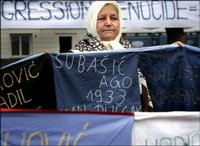U.S. DEPORTS TWO SREBRENICA MASSACRE SUSPECTS TO BOSNIA
UNITED STATES DEPORTS TWO SERBS WANTED FOR SREBRENICA GENOCIDE
 SARAJEVO - The United States deported to Bosnia two Bosnian Serbs wanted by a local court on charges of genocide committed in the 1995 Srebrenica massacre, officials said.
SARAJEVO - The United States deported to Bosnia two Bosnian Serbs wanted by a local court on charges of genocide committed in the 1995 Srebrenica massacre, officials said."The United States authorities deported today two persons and handed them over to Bosnia-Hercegovina's prosecutors' office," the prosecutors' office said in a statement.
The statement identified the two only as Zdravko B. and Goran B. adding that they were "suspected of participation in war crimes and genocide committed in July 1995 in Srebrenica." Their identities were revealed by the Court of Bosnia-Herzegovina. They are: Goran Bencun and Zdravko Bozic [source].
Speaking on condition of anonymity, a senior police officer told AFP that the two were "Bosnian Serbs" who were "handed over to Bosnian police at the Sarajevo airport around noon (1000 GMT)."
The US embassy here could not comment immediately.
The July 1995 Srebrenica massacre of over 8,000 Bosniak (Bosnian Muslim) men and boys by Bosnian Serb forces is the worst massacre in Europe since World War II and the first legally established case of genocide in Europe after the Holocaust.
The atrocity became a symbol of brutality of Bosnia's 1992-95 war, which claimed over 100,000 lives.
It was qualified as an act of genocide by the UN war crimes court in The Hague.
Eleven Bosnian Serbs are currently on trial before the Sarajevo-based Court of Bosnia-Hercegovina (link) for killing more than 1,000 Bosniak civilians in a single day during the massacre. They are facing genocide charges.
The Srebrenica massacre is at the center of genocide charges against Bosnian Serb wartime leader Radovan Karadzic and his army commander Ratko Mladic, both wanted by the UN tribunal.
The two, believed to be hiding in Serb-controlled part of Bosnia and in Serbia, remain on the run almost 11 years since the Srebrenica massacre.
Related:
1. Four Srebrenica massacre suspects appear in Court
2. Chilling custody in immigrand fraud case (new update)
3. Butcher of Srebrenica wants his own admission kept silent
4. Elusive Justice: Marko Boskic, a man who gunned down 1,200 Srebrenica Bosniaks
5. Bush administration has no interest in prosecuting Srebrenica massacre suspects
6. Phoenix: Mecca for Srebrenica massacre fugitives
2. Chilling custody in immigrand fraud case (new update)
3. Butcher of Srebrenica wants his own admission kept silent
4. Elusive Justice: Marko Boskic, a man who gunned down 1,200 Srebrenica Bosniaks
5. Bush administration has no interest in prosecuting Srebrenica massacre suspects
6. Phoenix: Mecca for Srebrenica massacre fugitives


<< Home